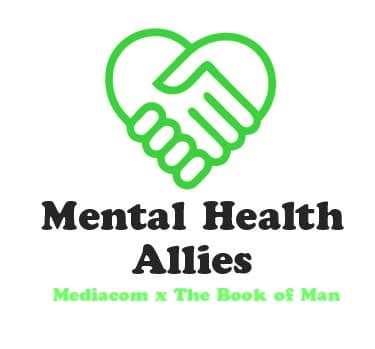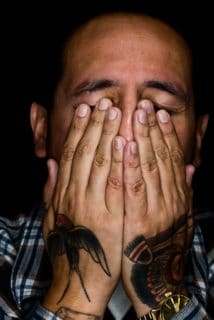Many young men aspire to climb the corporate ladder, rake in a huge salary and party every night on the company credit card. But what happens when the pressure to conform to macho stereotypes triggers mental health issues and a terrifying addiction? Ryan, 32, contacted The Book of Man and asked to share his story, in the hope of helping other men…
“I work in corporate finance and I’m a recovering addict. Since hitting rock bottom last year, I’ve discovered that mental health problems are nowhere near as uncommon as I thought. If I’m totally honest, I had no understanding of what ‘anxiety’ was – I assumed people who had panic attacks were just ‘a bit weird.’
If you’re not familiar with the corporate world, it can be a very alpha male-driven environment. Drinking with your clients is a big part of the job, too. I’d come into the office the next day having drunk 10 pints and 5 shorts and my bosses would praise me for it.
I started to feed that outlook into my perception of success. The more I drank, the more of a ‘legend’ I became. The ‘lads’ image I was trying to maintain resulted in selfish, disrespectful and childlike behaviour. Of course, the problem with existing in a world where people encourage that kind of archaic, alpha male behaviour, is that there’s no coping mechanisms and you feel unable to reach out to people for help.
I thought people who had panic attacks were just a bit weird.
As the pressure of work built, I started having panic attacks on trains and in meetings. The symptoms are similar to the ‘fight or flight’ response. You feel a tsunami of adrenaline wash over your body. You feel wildly uncomfortable and very sensitive to every sound, movement and change in surroundings. It sends you completely off tilt and makes it impossible to function.
The first few times I had a panic attack I thought I was having a heart attack. I thought, ‘Fuck, I’m going to have to ring an ambulance.’ But even though I was convinced that I was dying, I still didn’t ring an ambulance because I thought it would look weak, needy or dramatic. I mean, how stupid is that?
Because I am more sensitive than most guys, I guess I was trying to move as far away from that as possible. Which meant my behaviour became more and more removed from who I really was. That, coupled with the use of alcohol to find peace in my mind, was impacting my ability to cope with the anxiety and stress on a fundamental level.
Don’t be afraid to show weakness
I told work that I was feeling overworked and overwhelmed, but they didn’t really want to hear it. I felt partly to blame: I’d built up this macho persona of being able to ‘get things done’ and ‘achieve, achieve, achieve’, so people weren’t exactly keen to take me seriously when I admitted to struggling. Besides, my thought process was, ‘If I’m weak I won’t get promoted.’ Being emotionally vulnerable was perceived as weak or suggested that you were unable to handle the pressure.
I was working seven days a week – don’t feel sorry for me, it was my choice – and drinking to make the anxiety go away. Because of the confusion and lack of support, my drinking spiralled out of control. All I knew was, whenever I felt anxious or unable to function a drink would make it go away instantly. A quick fix in an environment where everyone wants everything done now. I became psychically addicted to alcohol and, before I knew it, I was drinking a litre of vodka a day just to function at work.
Addiction is a such cruel disease. It slowly takes over your life without you realising. You think you are in control when really it controls you, completely. It’s incredible how hard you’ll work to keep up with an addition – no matter how much stress your body is under.
I was drinking a litre of vodka a day just to function at work.
From a practical point of view, I kept vodka by the bed to stop myself fitting in the night. Every morning, I’d drink at home and cry. I had vodka hidden at work to get me through withdrawal in the mid-morning; lunch and evenings I’d drink with clients. I was indifferent to living but, weirdly, I didn’t want to commit suicide either. I basically just felt annoyed that I was still here and unable to see a way out.
I was a month, maybe two, away from losing my job. I wasn’t sleeping and, obviously, drinking that much every day takes its toll and becomes increasingly difficult to cover up. It would take me an hour to write a simple email. It still amazes me that I was able to function at all.
I gradually began to lose hope, but I didn’t know how to ask for help. Besides, I thought I was being a ‘successful guy’ by not asking for help. Successful people don’t need help, right? They are impenetrable, or so I thought, which turns out to be bollocks. I was gambling with my life.
Confronting the truth
Not knowing how to ask for help, I wanted something to break, to allow me to confront the problem. I pushed my drinking to the point where I was vomiting every morning. One morning I vomited up a pint of blood and then went to the loo and noticed that it was black. I was terrified. I called a GP friend and I admitted that I was using alcohol as a crutch to deal with the anxiety and pressure at work. He told me to get my arse down to A&E and tried to tell me that I was an alcoholic (which I tried to ignore, obviously). Acceptance and surrender are two very difficult things to find, which is why I needed to hit rock bottom.
In the end, I came to my senses and went to A&E (picking up a bottle of wine on the way and hiding it in my backpack). I drank whilst behind the examination curtain and after discharging myself through the unbearable DTs that I was going through.
The doctors told me that if I carried on drinking I’d die within five years from cirrhosis. I was in tears and finally said, ‘I need help.’
That wasn’t the end though. I continued drinking whilst signed off work trying to tapper off on my own will power. I tried getting help through drug and alcohol services on the NHS but it is a long drawn out process with a big waiting list. I didn’t have time to wait, I needed help.
I managed to tell my sister, who told my parents. I turned up to dinner a bottle of vodka down and an hour late, so my parents knew what they were dealing with. I got the call the next day to say I was being admitted to rehab – I was so relieved I cried unstoppably
Alcoholics Anonymous is a phenomenal program. It carries this weird stigma – I thought it was a load of half-asleep bums – but it’s been incredibly helpful, loving and life changing. Nobody is perfect, I got help and support and I become stronger as a result, I slowly allowed life back in through humility and hard work.
There is always help – you just have to ask, nothing more.
It’s taken me best part of a year to get my life back on track. Anxiety and addition is an ongoing battle, but’s a lot more bearable now that I’m sober and have a group of men around me who I am accountable to. I’ve learned to be honest and open and vulnerable, which something that men aren’t typically able to do.
The process of dealing with my anxiety and alcoholism has meant a complete shift in who I am as a person, which ironically, is not a stereotypical lad who seeks success at the cost of everything. I am a much better man as a result of facing up to what seemed like incomprehensible problems.
The purpose of me telling you all this is to help other men. I want them to know that mental health issues are not a ‘weakness’. You’re not ‘abnormal’ – that’s bollocks – and there is hope.
Anxiety and addiction is an ongoing battle, but if there’s a younger version of me out there, I’d like to think that they’d take a lot of encouragement from reading this. I know I would have.
There is always help – you just have to ask, nothing more.
Struggling? Need to speak to someone? These brilliant organisations are here to help.
Call CALM (Campaign Against Living Miserably) on 0800 58 58 58
Call Alcoholics Anonymous on 0800 9177 650
Trending

Join The Book of Man
Sign up to our daily newsletters to join the frontline of the revolution in masculinity.








